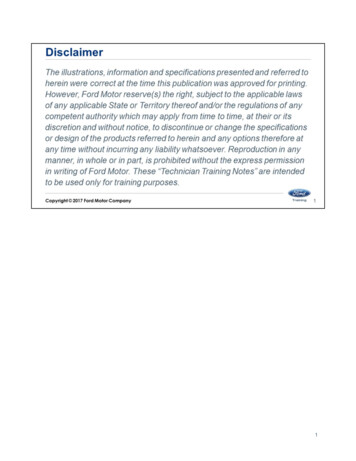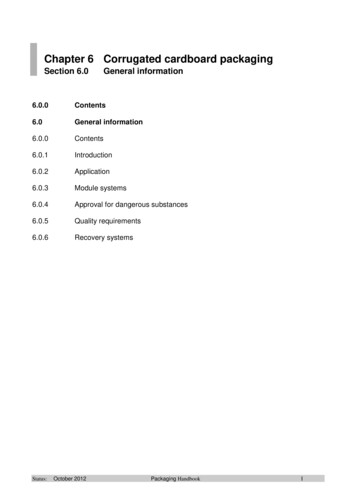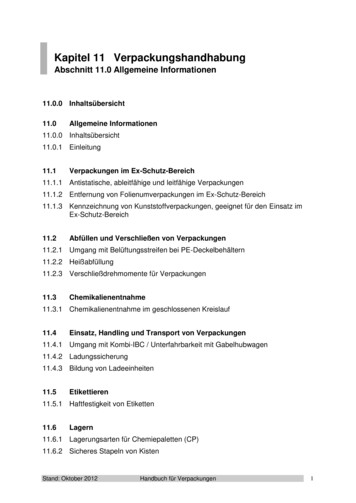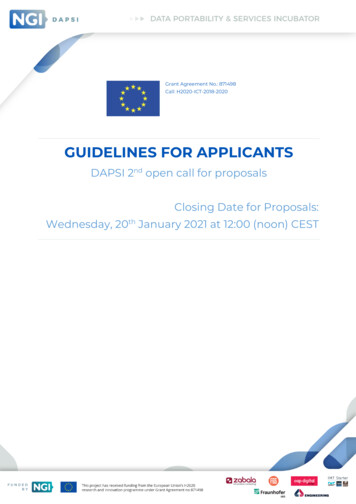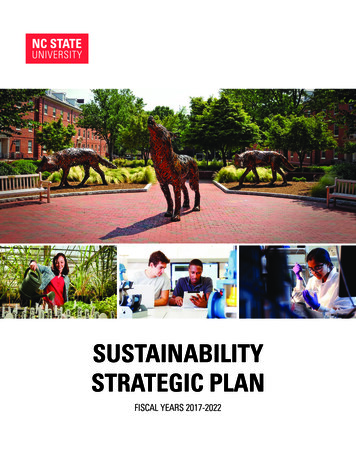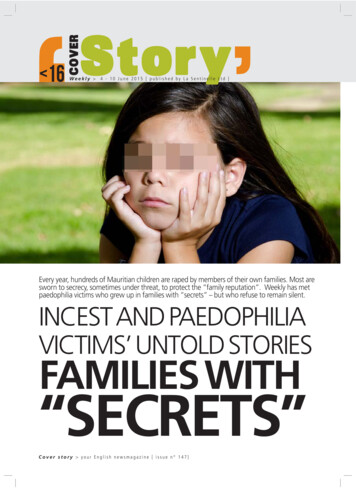
Transcription
StoryCOVER 16Weekly 4 - 10 June 2015 [ published by La Sentinelle Ltd ]Every year, hundreds of Mauritian children are raped by members of their own families. Most aresworn to secrecy, sometimes under threat, to protect the “family reputation”. Weekly has metpaedophilia victims who grew up in families with “secrets” – but who refuse to remain silent.INCEST AND PAEDOPHILIAVICTIMS’ UNTOLD STORIESFAMILIES WITH“SECRETS”Cover story your English newsmagazine [ issue n 147]
“I’m scared of everything, sexual relations are difficult, I have no selfconfidence, I’m anxious and I get panic attacks.”Padma*, ex-paedophilia victim.By Lina Myte PASCALAruna* was five years old thefirst time her mother called her awhore. She didn’t understand whatthe word meant. And she didn’tunderstand the game her big cousin wanted to play at grandma’splace in Calodyne. She didn’t thinkthat it was nice of him to lie downon top of her so that she couldn’tmove. And it wasn’t nice of him toput his pee-pee between her legs,because there was a sharp, excruciating pain that made her want torun away.Every day, many children goto bed at night wishing that daddy,mommy or an uncle won’t entertheir bedrooms. Over a hundredcases of child sexual abuse werereported between January andMarch 2015 to the government’sChild Protected Unit (CDU). Theflow is never-ending. New month,new paedophiles. And every singlemonth, 20 new cases land on thePolice Family Protection Unit’stable. In 80% of cases, the suspectsare blood relatives or other peopleclose to their young victims. “InMauritius, most of the time, kidsdon’t get raped by strangers on thestreet,” Chief Inspector VirenBudree, who heads the BrigadePour la Protection des Mineurs(BPM), confirmed. “The dangeris a lot closer to home,” he said.When Aruna told grandmawhat the big cousin had done withhis pee-pee, her face went grey.Grandma went to fetch an auntie,who is a doctor. The auntie examined Aruna, sighed, and then gavethe instructions that would cometo define the rest of her childhood:“Don’t you dare tell anyone”.In fact, the danger is at home– but you need to erase the mentalimage of a disturbed uncle whorapes a child while mommy anddaddy are unaware. Often, mommy and daddy know exactly whatgoes on behind closed doors. Theyknow – but choose to do nothing.“Protecting the family reputationbecomes more important thanprotecting the child,” said MélanieVigier de Latour-Bérenger, psychologist and director of NGOPédostop. The fear that dimounpou koz zot koze (gossip aboutthem) is an integral part of the“Sometimes neighbours don’t report child sexual abuse outof fear of what the consequences will be.”island culture, gets amplified andtaken to extreme and sickeningproportions. Theirs become afamily of “secrets”.Aruna didn’t tell anyone aboutthe game that hurt, but mommyand daddy now call her a “dirtygirl”. It is her fault that her cousinmakes her pee-pee hurt, they say.She makes him do it by being dirty.Just after he first began hurting herlike that, Aruna walks up to a littleboy who she doesn’t like in kindergarten and pulls his pants down.She tries to put his pee-pee insideher because it’s a game that you canplay with people when you want tohurt them. The pre-primary schoolteacher sees everything and stopsit. “Why did you do that, Aruna?”she asks.The fight against paedophiliain Mauritius has become a battleagainst families with secrets. Somuch so, in fact, that the world“secret” is used as a key word inpolice awareness campaigns inschools and kindergartens. “Weteach children the difference between good and bad secrets,” Sylvia Rajiah, inspector at the PoliceFamily Protection Unit, said. Goodsecrets are birthday and Christmaspresents. Bad are of the kind thatKema* experienced when she wasthree years old, when her uncle andneighbours started abusing her“Over a hundred casesof child sexual abusewere reported betweenJanuary andMarch 2015to the government’sChild Protected Unit.”sexually. “They told me not to tellanyone because no one would believe me anyway,” she says.Aruna tells the “Miss” at kindergarten that it’s a game, a badgame that makes everything hurt.Her big cousin always wants to playit. But mommy is angry that Aruna talked about the secret game andher voice is loud when she speaksto “Miss”. Then, Miss says that shewon’t tell and everybody is happyagain. Aruna must call her rapist“Big Brother”, mommy says.There is no such thing as atypical “profile” of a family of se- 17crets. They’re everywhere, inevery socio-economic environment. You’ll find them in church,temples, mosques and within charity organisation, where they arebusy defending human rights, too.Some are articulate, extremely polite and smartly dressed. “Appearance doesn’t mean a thing when itcomes to child abuse,” Chief Inspector Budree said. It’s also a hugemisconception that child sexualabuse is linked to poverty or liberal values, according Vigier deLatour-Bérenger. By buying intothe myth, members of the publicunknowingly become part of thecycle by making families with secrets even more adamant to keepthem. They need to keep up theillusion that in their ‘good’ family,sexual abuse can’t exist.On Aruna’s 7th birthday, thereis a cake and a party. But Arunadoesn’t smile, not even when thecameraman points his lens at her.She can’t smile because on the inside there is only anger. Arunadoesn’t know why she is so angrybut she knows that she has to hurtthe other children in school. Shehas to scream and shout. She justhas to.In families with secrets, paedophilia and incest can becomepart of the family culture, a culturethat becomes the norm and ispassed on from generation to generation. Lack of information allowsthem to wrongfully dismiss sexualabuse as a trivial matter that doesn’thurt the child beyond the physicalpain. But as the kiddie-sizedclothes are tampered with, so is thechild’s future. Granted, years intherapy and personal strength canmake the scars fade. But they never disappear completely. Padma*,who was seven when the very people who were supposed to protecther began taking advantage of herbody, wishes that she could explainto others to what extent the abusedamaged her – but she can’t. “I’msorry but the list is too long,” shesaid. Here are a few examples: “I’mscared of everything, sexual relations are difficult, I have no selfconfidence, I’m anxious and I getpanic attacks.”Aruna hears people whisperthat she used to be such a sweetchild. She’s an angry child now. It’syour English newsmagazine [ issue n 147] Cover story
StoryCOVER 18Weekly 4 - 10 June 2015 [ published by La Sentinelle Ltd ]a pity that mommy and daddy haveto put up with such a bothersomelittle girl. They’re good people.Aruna knows that they are becauseeveryone says so. They even donated a piece of land to the localtemple, that’s how kind they are.Kema, who was three when theabuse began, has a list of her own:“I have no self-confidence, I don’ttrust other people, I look downupon myself and others, I’m waryand aggressive, I have a low opinionof men, sex is difficult, I get nightmares and I’m scared.” WhenKema was sexually abused as atoddler, and then again when sheturned eight, she said nothing tothe adult world. Today, she wouldlike to say this: “Everyone needs tobe more vigilant, and learn to recognise the signs that a child hasbeen sexually abused.”When Aruna turned 16, sheswallowed a whole bunch of painkillers. She just can’t handle thepain anymore. It’s too much, andshe never wants to wake up. Butshe hadn’t bought enough pills, sherealised, because death didn’t cometo release her.When local police officers walkinto kindergartens and schoolshoping to convince abused childrento speak up, they know that theyare fighting a difficult battle. Inspector Rajiah says, “We’re basically asking them to trust strangers(the police officers) and go againstthe instructions given by their ownparents or other family members.It’s not surprising that not all ofthem can do it.”Daddy leaned over Aruna’sbody when she regained consciousness. “If you want to kill yourself,go ahead!” he said. The family willthen tell everyone that she hadkilled herself over a boy. Arunawon’t live forever – but the familysecrets will.If families with secrets are allowed to exist, it is because we –the rest of society – allow them todo so. “Sometimes neighboursdon’t report child sexual abuse outof fear of what the consequenceswill be,” Inspector Rajiah said.The consequences for themselves,that is, not for the child. Here isan uncomfortable truth: We justdon’t care that much about thechildren of others.In another family, eight-yearold Nathalie tried to ask her daddy’scousin why his urine was so whiteand thick. A strange sound alwaysescaped from his mouth when thewhite pee came out. It hurt a lotwhen he put his weenie betweenher legs. Nathalie wanted to askmommy why the “uncle” wouldn’tlet her watch cartoons on the tellyunless she placed her legs in strangepositions. But mommy would dieif she said anything. That is whatthe uncle said. Nathalie didn’t wantmommy to die, so she kept quiet.The culture not to report suspected child abuse cases cannot bewritten off as a mere desire to saveone’s own skin, though. There isthat, but it is also a question ofwanting to respect other people’sprivacy. It is a misplaced and dangerous form of politeness. “Peoplewould criticise me, telling me thatI was weird and introverted,” Padma, who was sexually abused whenshe was seven, remembers. No oneever attempted to find out why.It was strange and scary thatNathalie always had to touch theuncle’s weenie. But grandma andthe “aunties” in the house knewthat they were playing the weeniegame and they didn’t say that it wasbad. One day, mommy took Nathalie to the doctor. The doctorlooked very, very upset when heexamined her little body. Then,mommy said, “Just let me handleit myself” and the doctor nodded.Each time the police go out toschools to talk about paedophilia,“Protectingthe the child.”an average of two children stepforward with stories, said Inspector Rajiah. Sometimes, the storiesare about themselves. At othertimes, about a friend. “Victimsoften find it easier to speak toother children than to an adult,”she said. “It’s important to workwith all children because many ofthem walk around with secrets,even if they aren’t their own.”In the past, teachers and family doctors could – and often were– sweet-talked by parents into turning a blind eye to any sexual abusedisclosure coming from the children they tended to, buying intothe argument that it was “privatebusiness”. While stricter rules havemade that impossible, at least froma legal standpoint, many teachersstill lack training and can’t spotobvious signs of sexual abuse, according to Pédostop.In school, some nice ladiescome and talk to Nathalie and theCover story your English newsmagazine [ issue n 147]other children about their bodies.They talk about the weenie game,but something isn’t right becausethey say that children can’t play it.At home, the uncle tries to giveNathalie a magazine with picturesof naked mommies and daddies init. They all play the weenie game.“You CAN’T touch me. It’swrong!” Nathalie shouted once.The uncle looked shocked. Henever touched her again but thedamage had already been done.There are no heroes in Aruna’sand Nathalie’s stories. No knightsin shining armours came to theirrescue when they were abused andconfused little girls, who wereraped by members of their ownfamily and made to feel guilty forit. Growing up, they were constantly angry without ever understanding why. Like many children,they pushed the memories of theabuse to the back of their minds,where they hurt less.Aruna married early. Not forlove, but because she wanted to getaway from her dysfunctional family. She had children of her ownbut found that she couldn’t relateto them. “I would scream at themfor nothing, and constantly tellthem that everything was theirfault,” she remembers. You felldown and hurt yourself, son? Yourfault. You stained the carpet? Yourfault, for being so incredibly clumsy. Come here and let me give youa good beating.Nathalie never married butwent from relationship to relationship, never allowing anyone tocome close enough to love her.Growing up, she had been brainwashed into believing that a girl’sonly asset is her virginity. Well,that was stolen from Nathaliewhen she was a kid, so what wasthe point of anything? Nathalieneeded to escape and chose a profession that allowed her to travel.Inside, she was a mess, as wasAruna. The anger was a constantcompanion. A minor car accidentcould make Aruna so angry thatshe almost felt like killing thedriver who had committed a minor offence. While too many exvictims of paedophilia suffer forthe rest of their lives, both Arunaand Nathalie were strong enoughin the end to face the memories of
“I have no self-confidence, I don’t trust other people, I look downupon myself and others, I’m wary and aggressive, I have a lowopinion of men, sex is difficult, I get nightmares and I’m scared.”Kema*, ex-paedophilia victim.the abuse. They both had therapyand also found solace in religion.It was painful but they came outexperiencing an exhilarating feeling of being free at last. Aruna issuing her “big cousin”. Nathaliefound that she couldn’t move onwith her life unless she “forgave”her paedophile uncle, and so shedid. “But if ever I see his faceagain, I will tell him that what hedid to me was wrong, and to whatextent it damaged me,” she said.Both Aruna and Nathalie havespoken to their families about theabuse. They are now being treatedas outcasts – traitors who want toharm the family reputation. Theirfamilies have more than just one“secret” to keep, they have cometo understand. For Aruna, realisation hit after her failed suicide attempt. Her mother told her to stopmaking such a “big deal” out of thefact that she was raped as a fiveyear-old. “You’re not the only one,you know,” she shouted. Today,Aruna knows that several membersof her family, of both past and present generations, were sexually andphysically abused as children. Itsimply became part of the familyculture. Nathalie suspects that herlittle brother was abused as well,and that her mother too grew up ina physically violent environment.Families with secrets will continue to make new “secrets” to keepuntil someone breaks the cycle.Aruna is convinced of it. If shehadn’t dealt with the memories, shewould have become just anotherbrick in the game, she said. Whatwould have happened if her ownsons had been sexually abused byanother member of the family?“Perhaps I would have ended upprotecting the ‘secret’,” Aruna saidcandidly. “To be honest, I probablywould have, had I not changed, andmy sons could have grown up tobecome abusers, too.”Today, Aruna is a differentkind of mom. After having undergone therapy, she had a long talkwith her eldest son (the youngest isstill just a toddler). “I told him thatI was sorry. I said: “When mommyhurt you before, it was becausemommy had been hurt a lot whenshe was a child, but parents don’tactually have the right to hit theirchildren.” She couldn’t see his reaction because of all the tears thatblurred her vision but she couldhear him say “Stop crying, mom”.Then, he went to fetch a drawinghe had done in school, about children’s rights. Aruna is satisfiedwith her life today, as is Nathalie.They are on a quest to leave behinda healthy family heritage, not oneconsisting of secrets.Families with a culture of incest and paedophilia can bestopped from within by ex-victims“Each timethe policego out toschools totalk aboutpaedophilia,an averageof twochildrenstepforwardwithstories.”who are strong enough to handlethe rejection that often followspublic disclosure. Five-year-oldAruna, eight-year-old Nathalieand thousands of abused childrenlike them, however, deserve betterthan having to wait half a lifetimeto be set free. They were let downby a society that just didn’t careenough. And so, the real challengeis to make Mauritians look at paedophilia as a serious societal problem rather than a family affair.The veille-to-zafer (mind your ownbusiness) attitude that allowsfamilies with secrets to thrive hasto die. “Anyone who thinks that 19families have the right to mindtheir own business when it comesto this needs to think long andhard about what they would wantothers to do if their own childrenwere in danger,” Chief InspectorBudree said. “Would you wantthem to speak up or say nothing?”The time has come to make achoice about what kind of societywe want to live in. One that looksaway when five-year-olds are rapedin their own homes, simply becausethey’re someone else’s children, notour own. Or, a society where thereis no such thing as someone else’schild when it comes to paedophilia.They are all our own children andthe blood on the mattress is thehands of all of us.My name is Aruna. I want tosay that we shouldn’t be afraid totalk about paedophilia, nor shouldwe be afraid to denounce it. I’m aformer victim and I’m not afraidanymore. I’m not afraid to talkabout it and I’m not afraid to makemy abuser face the justice system.My name is Nathalie. Havingmyself been a victim of incest andpaedophilia, I want to encourageothers to speak up. Talking aboutit makes you conscious that youare not to blame for what happened to you. Letting your suppressed, compressed and oppressed anger come out at last willallow you to heal. nyour English newsmagazine [ issue n 147] Cover story
StoryCOVER 20Weekly 4 - 10 June 2015 [ published by La Sentinelle Ltd ]How families withsecrets operateFor families who want to puta lid on paedophilia, the first stepis to make sure that the childkeeps quiet. Swearing a victimto secrecy is seldom difficult,seeing that the paedophilic modus operandi is to reverse theblame and put it on the victim.“They told me that it was myfault,” Kema*, who was abusedas from the aged of seven, said.The strategy worked as Kemahelped cover up the abuse untilshe was a grown woman, as didPadma, abused since she was atoddler. They never took theiraggressors to court. And so, forevery case that reaches the authorities (the CDU deals witharound 300 per year), there aremyriads more that go unreported. The abusers know their victims and they know what buttonsto press to make sure that theykeep the ‘secret.’Mommy and daddy embarkon a damage-control exercisewith the aim of preventing the“secret” from coming out. Thekid, you ask?” “Oh, the childcontinues to get subjected tosexual abuse,” said Vigier deLatour-Bérenger. In otherwords, children are allowed tocry when adults in the familyrape them – as long as they crysilently.While some families findthis normal, others are in denial. Sometimes, the lie is soconvincing that they end upbelieving in it themselves. In therare cases when child sexualabuse within the family doessurface, the outside world tendsto pass particularly hard judgement on mothers who stood byand said nothing when theirhusbands had sex with theirlittle girls or boys. Some of thesemothers, according to Frenchresearcher Martine Nisse, become so blind to the abuse thathappens right in front of theireyes that they are short of beingthe paedophile’s wingmen. In astate of total denial, they can’teven see that their child is suffering. “Often, the mothers,too, went through a traumalong ago and became emotionally anaesthetised,” Vigier deLatour-Bérenger explained. n* The names have beenchanged.REALITY CHECK]By Iqbal AHMED KHANAwkward bedfellowsDogma often arranges for some very awkward bedfellows. A case in pointwas the recent decision by British American Tobacco to raise cigaretteprices in Mauritius between Rs5 and Rs10 for its various brands. Theannouncement was greeted with glee by anti-tobacco campaigners. Butwhy would they – who usually pretend to be on the ‘progressive’ side ofthe aisle – cheer greater profit for an already Rs10 billion a year industry?To understand this, it’s important to understand the market fundamentalismthat guides the push for higher cigarette taxes. Like neo-liberal economists,anti-tobacco NGOs have imbibed the questionable notion that the market isa rational actor. So, as the logic goes, the more expensive you make a cigarette,the less people will buy it and everything will be fine and dandy.This assumption, for obvious reasons, is ludicrous. For one thing, cigarettesare addictive, so it’s not exactly like choosing between two cans of tomatoes at the supermarket. And even if we assume that raising prices canreally stamp out unwanted consumption, then this model really cannotexplain why the drug trade continues to exist. After all, heroin is muchmore expensive than cigarettes and yet demand for it – often by peoplemuch poorer than an average cigarette smoker – continues to be strong.Not understanding this basic point is why, despite nearly a decade and ahalf of raising the price of cigarettes, 40.3 per cent of Mauritian men and3.7 per cent of women still gleefully puff away, not that there is anythingwrong with that.Another point lost on the anti-tobacco crowd is that how effective nominalprice rises will be depends upon how expensive cigarettes will be relative toother things. Put simply, if everything else is getting expensive, a nominallymore expensive cigarette won’t stand out on a grocery bill. In recent years,successive governments pushing for a lower rupee has meant that the priceof just about everything has gone up. That means that the effect of raisingcigarette prices has become drowned out. All it has ended up doing is makingthe cost of living for middle and working class people higher without doingmuch to press the message home. That’s why in 2012 the International Tobacco Control (ITC) project in Mauritius had to admit that higher pricesdidn’t even figure in the top three considerations of why people quit tobacco.Of course instead of getting the message, the anti-tobacco crowd simplypushed for more regressive price rises.But another reason why all this will not work is simply because peoplewill either switch to cheaper (and more dangerous) forms of tobacco orwill have recourse to buying single cigarette sticks. Even though buyingsingle cigarettes is technically illegal, the ITC admitted that one-third ofsmokers still bought cigarettes individually. A conclusion that a visit toany tabagie can demonstrate.It’s easy to see why the government continues to cling onto this cornucopia of bad ideas. After all, they make Rs3.9 billion a year off taxing cigarettes. For the anti-tobacco crowd, their inability to think outside theneo-liberal box is the culprit. That’s why we are here today.Cover story your English newsmagazine [ issue n 147]
Cover story your English newsmagazine [ issue n 147] 16 COVER Story Weekly 4 - 10 June 2015 [ published by La Sentinelle Ltd ] Every year, hundreds of Mauritian children are raped by members of their own families. Most are sworn to secrecy, sometimes under threat, to protect the "family reputation".
